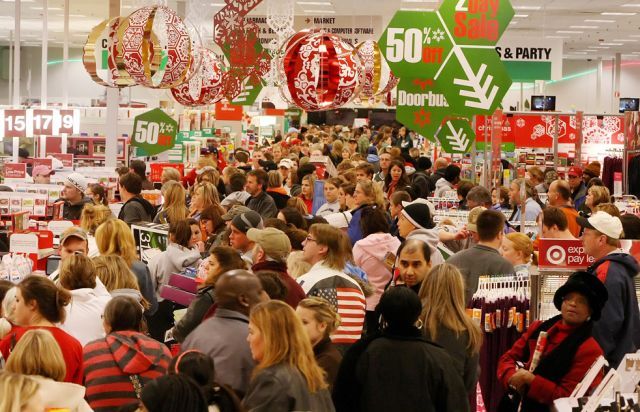|
The Business of the Christmas Season

Commercialism,
long criticized, as a distortion of the true celebration of Christmas, has become a crucial profit component for the corporate
economy. Very little observation about the religious nature of the holiday rises for reflection. Likewise, even less focus
is devoted to the underlying reasons why holiday gifting has become a stable to the season. Heritage and tradition has given
way to popular cultural advertisement. A disconnect between purchases of necessity and acquisitions of disposable novelties
is the hallmark of the mad rush to buy needless objects. As long as
the psychology of the herd and the guilt of the good parent deem it is an obligation to fork out money that is usually not
available, the credit and debt purchases cycle continues. The National Retail Federation is forecasting holiday sales will increase 3.9 percent to $602.1 billion. Yet a consulting firm, commissioned
by NRF, projects a reduction in individual spending. "According to NRF’s holiday consumer spending survey conducted by Prosper Insights
& Analytics, the average holiday shopper will spend $737.95 on gifts, décor, greeting cards and more, two percent
less than the $752.24 they actually spent last year."
In
spite of this pattern, the average holiday shopper is part of a very allusive community. How many people do you know that
actually spends this kind of money? If you answer in the affirmative, you might well be in need of shopaholic rehab treatment.
The Mad Men on Madison Avenue work for corporate clients. Main street merchants provide the sensible alternative to big box
stores. Will you make the switch or are you infected with the ether zone smart phone bug. Yet,
the seemingly attractive cost sensitive pricing and online convenience has increased. Matt Couden writes in the Examiner article, on the rush to buy online.
"A Dec. 3 report from Biz Journals out of San Francisco,
notes that Monday’s online shopping was a single-day record, with sales up 19% from last year. The
reports come about online shopping’s success as bad news has hit the retailers with "brick-and-mortar" stores,
who saw their first decline in shopping over Black Friday weekend since 2009."
"Even
Wal-Mart reported weak sales last month and shared its view that a challenging environment would persist into the fall. Then
this week Wal-Mart announced it was cutting orders to reduce its inventory for the rest of the year. In the company’s
commentary there were two key items that don’t bode well for the upcoming holiday shopping season. First, consumers
are not spending at the rate predicted by Wal-Mart executives. Second, Wal-Mart isn’t hiring enough workers to keep
its shelves stocked. Remember, Wal-Mart is the country’s largest retailer and if it is seeing this problem odds are
it is not alone."
All these statistics and trends
may seem interesting to a Wall Street analysis or a participant in the chain of product placement. Still, most consumers are
not directly employed in the retail industry. Statistics and Facts on
the Christmas Season in the U.S., as published by The Statistics Portal indicates. "Christmas is typically
the largest economic stimulus for many nations around the world as sales increase dramatically in almost all retail areas.
The United States' retail industry generated about three trillion U.S. dollars during the holidays in 2012. These holiday
sales reflected about 19.3 percent of the retail industries total sales that year. As a result, just over 720 thousand employees
were hired throughout the United States to compensate for the holiday rush."

Since
the dramatic bulk of sales and certainly the major component of profit, determined by the outcome of Christmas mania, economists
are eager to evaluate the results. Fine for the big name outlets, but what about the independent strip store or the local
entrepreneur. They risk their entire livelihood, in the hope of steady and consistent sales all year round as their goal.
For these folks, the traffic that storms the mega stores is another lost opportunity to keep their enterprise in business. Small Business Saturday
fosters mom-and-pop shopping is the answer. The only way to reverse this terrible trend is to support
your local businesses. "Nationally,
market share for local retailers vs. national chains declined from 59% in 1990 to 48% in 2009, according to another Civic
Economics study. For bars and restaurants, local market share dipped to 64% from 71%."
Look at retail business from a different perspective. Small business cooperatives are one
way for independent retailers to improve their buying power and advertisement placements. While Christmas sales reward specialty
boutiques and trendy holiday items, the health and vitality of any business rests upon repeat customers. Abandon foolish credit purchases, which never make sense. Consider the productive value
of infusion monies, normally spent on discarded holiday hype; be directed at buying useful products from within your local
community. You do not have to turn into Scrooge to celebrate Christmas
intelligently. An all Amazon delivery that bypasses Santa might save you a few dollars, but a scaled down gifting bazaar bears
wholesome fruits, when selectively purchased. All those acclaimed 720
thousand seasonally part time employees would be much better off with a permanent job. Excessive and binge buying, based upon
a cultural holiday pressure to spend, is basically dumb. Woefully, the
business of Christmas is destructive to a sound and stable economy. Consumers squander their hard-earned money cheerfully,
because they seek immediate gratification at the cost of lasting happiness. Have a Merry Christmas by accepting Jesus as Lord
and Savior. James Hall – December 25, 2013
Subscribe to the BATR Realpolitik Newsletter
Discuss or comment about this essay on the BATR Forum
|

